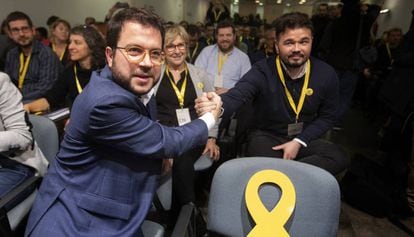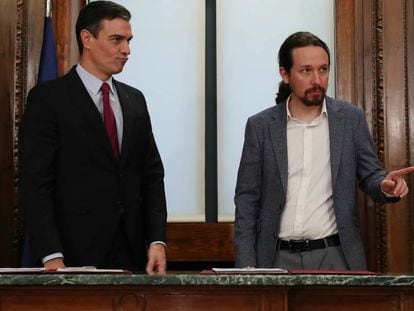The last chance
At this weekend’s investiture debate, prime ministerial candidate Pedro Sánchez must give a full explanation of the deal he has made with ERC on future talks about Catalonia

The strategy adopted by the Socialist Party (PSOE) in order to see its prime ministerial candidate, Pedro Sánchez, succeed at an investiture vote in Congress has turned the debates that will begin on Saturday into the last chance for an explanation to assembled lawmakers and to Spanish citizens of one of the crucial points of the party’s manifesto: the policies that they will adopt in Catalonia.
The ERC deal must be debated in Congress as part of the political program that is being voted on
The agreement that the PSOE has signed with the Catalan Republican Left (ERC) in order to secure the latter party’s key abstention at the investiture vote must not be left out of the debate that will take place in Congress, in particular since the text has been written in a way that the most significant part is what it doesn’t say, rather than what expressly appears.
In the face of a document like this one, it is worth remembering the constitutional requirement that the prime ministerial candidate must clearly explain what he is planning to do from government. It does not fall to citizens to deduce this based on the emphatic prose of an agreement without which there would be no investiture. As such, the ERC deal must be debated in Congress as part of the political program that is being voted on.
The political paralysis in which Spain has been immersed in recent years cannot make way for a sterile, scholastic thought experiment about what the authors of the deal wanted to say. On the one hand, the text has sparked hopes that could end up being unfounded, and on the other, it has provoked overreactions such as that of the current leader of the center-right Ciudadanos (Citizens) party, Inés Arrimadas, and that of conservative Popular Party (PP) leader Pablo Casado.
There will be no benefits in spreading the divides in Catalonia to the rest of the country, even more so from a government that will be born fragile
The solutions needed for the problems that were created when Catalan pro-independence leaders began imposing their own program through facts on the ground do not include establishing new relationships between words and their meaning, but rather by focusing on the underlying reality of the situation and dealing with it from the institutions and with existing procedures. Focusing on the reality does not consist of asserting that a conflict is political, but rather in precisely designating the figures involved in its development, and why it happened in the first place.
For the pro-independence forces, this conflict is seen as being between themselves, acting as spokespersons for the whole of Catalonia, and the Spanish state. For the Socialists, this has, until now, been a conflict between citizens of Catalonia who are for or against secession. But the negotiations set out by the agreement between the PSOE and the ERC do not correspond to this logic.
The same goes for the “democratic validation” established in the document as a means to ratify any decisions that may be taken by two state institutions that – as long as they act within the scope of their constitutional powers – do not need to mutually acknowledge each other’s legitimacy, nor do their mandates, received from citizens, need to be ratified through a direct vote. If the Socialist candidate does not offer more explanations about the content of these decisions, the formula agreed with ERC is, quite simply, dangerous.
The fact that the document has met with a stern response from both the pro-independence side and the opposition to the imminent government of Pedro Sánchez does not evidence the virtue of a balanced proposal, but rather the risks of the political and social divides that it may cause. There will be no benefits in spreading the fracture in Catalonia to the rest of the country, even more so from a government that will be born fragile and could become even more so should it choose not to appear in Congress with all of its cards face up.
English version by Simon Hunter.












































